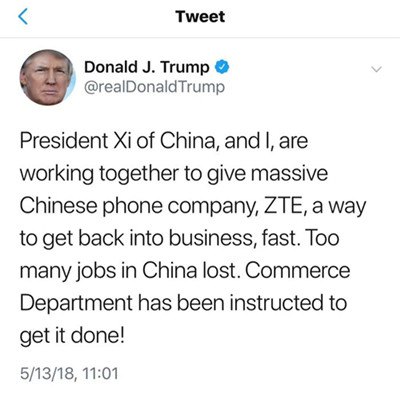
The screenshot of the official account of Trump's Tweet.
U.S. President Donald Trump said on Sunday that he has instructed the Commerce Department to help China's ZTE Corp get back to business, a sign that experts believe helps set a positive tone for upcoming trade talks in Washington between senior Chinese and U.S. officials.
ZTE, one of the largest telecom equipment manufacturers in China, announced last week it would suspend major operations after the U.S. Commerce Department last month banned U.S. companies from selling to the Chinese company until 2025.
The U.S. has charged ZTE with violating U.S. laws by illegally shipping U.S. goods to Iran and breaching a deal reached last year. ZTE has denied the breach of the deal and appealed the U.S. ban.
ZTE claims that the ban "will severely impact the survival and development" of the company, which depends on U.S. companies for providing about a quarter of its technology components.
In a tweet on Sunday morning, Trump said, "President Xi, of China, and I are working together to give massive Chinese phone company, ZTE, a way to get back into business, fast. Too many jobs in China lost. Commerce Department has been instructed to get it done!"
"I see this as a positive step and hope it will create a better atmosphere for the ongoing discussions between the two countries," said Henry Levine, a senior advisor at consulting firm Albright Stonebridge Group and a former U.S. deputy assistant secretary of commerce under President George W. Bush.
"I hope that Beijing can respond with a positive step of its own and hope that both Beijing and Washington can begin a positive tit-for-tat process where each takes positive steps and the other one responds with its own positive steps," Levine said.
Eswar Prasad, a senior fellow at the Brookings Institution and a former China division chief at the International Monetary Fund, said Trump's tweet sets the stage for a temporary de-escalation of trade tensions between the two countries.
"It bodes well for the upcoming visit by (Chinese Vice-Premier) Liu He to Washington and suggests that an agreement can be reached that allows both sides to claim at least a partial victory," he said.
But Prasad cautioned that it is unlikely to eliminate all of the trade tensions between the two countries, which are likely to flare up in the coming months. "There are still some fundamental differences between the views of the two countries, which will not be easy to reconcile," he said.
U.S. Treasury Secretary Steven Mnuchin led a senior trade delegation to Beijing early this month for talks with Chinese officials. While both sides have reached some consensus, major differences remain.
A spokesman for China's Ministry of Commerce said after the talks that during the two-day meetings, China made solemn representations to the U.S. side regarding the case of ZTE Corp. The spokesman said the U.S. side said that they would pay attention to these representations and report China's position back to their president.
While the U.S. ban has dealt a devastating blow to ZTE, companies in the U.S. and other countries which are part of the supply chain are also suffering. Stock prices of U.S. optical components makers such as Acacia Communications, Oclaro Inc, Lumentum Holdings Inc, Finisar Corp, Inphi Corp and Fabrinet fell sharply after the announcement of the ban.
ZTE paid more than $2.3 billion to 211 U.S. exporters in 2017, Reuters quoted a senior ZTE official as saying. The Chinese company had more than 80,000 employees in 2016.
ZTE and Huawei, another Chinese telecom equipment giant, have been successful in other parts of the world, but they have long been the target of some U.S. lawmakers and politicians, who described the Chinese companies as posing a threat to U.S. national security.
Many in China believe the U.S. restrictions on the two companies are aimed at disrupting the development of China's high-tech sector, in particular the 10 industries defined in the Made in China 2025 effort to advance the country's modern manufacturing capability.
China and the U.S. have seen their trade tensions escalate in the past months following the unilateral U.S. tariff imposition and threats on Chinese imports. Besides tariffs, the U.S. is also likely to impose tougher restrictions on Chinese foreign direct investment in the U.S., in particular the technology sector.
Both moves have caused grave concerns over a trade war between the world's two largest economies.


















































